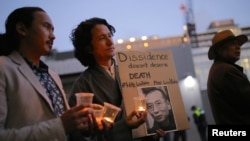The hospital treating ailing Chinese dissident Liu Xiaobo for late-stage liver cancer says the Nobel Peace laureate's is suffering from respiratory failure.
The First Hospital of China Medical University, located in the northeastern city of Shenyang, posted a statement on its website Wednesday saying Liu's family has refused to allow doctors to perform a tracheotomy, a procedure in which a tube is inserted into his windpipe to help him breathe.
The hospital announced earlier in the day that the 61-year-old dissident is suffering from shock and organ failure. It added that blood clots have formed throughout his body.
Liu was granted medical parole in May after his cancer was diagnosed. Beijing has ignored pleas from the United States, Germany and numerous human rights groups to allow Liu and his wife to go overseas so he can seek treatment, claiming he is too sick to travel and is getting the best medical care in China.
Two doctors from the United States and Germany visited Liu last weekend at the Shenyang hospital, and declared him well enough to travel. But a video of their visit released earlier this week showed the visiting doctors praising their Chinese counterparts.
The German embassy in Beijing issued a statement Monday criticizing China, noting that "security organs are steering the process, not medical experts."
Liu is a poet and human rights activist who was arrested after writing "Charter ’08," a manifesto calling for democratic reforms in China, and awarded the Nobel Peace Prize in 2010 for his campaign for democracy and human rights. He was sentenced to 11 years in prison for “inciting subversion of state power," a law often used by Chinese authorities to silence dissidents.











